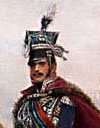 |
| Strategic Situation |
Napoleon had to choose between two courses of action. On the assumption that the enemy could not approach the defenses of Paris in strength before mid-August, the Emperor might employ the further two-month lull to raise and train more forces, and eventually mass the bulk of his army in the vicinity of the capital between the Rivers Seine and Marne -- but this time with at least 200,000 men at his disposal as compared with only 90,000 the previous year. If this defensive strategy was adopted, by early August the French army could be disposed as follows to meet the anticipated two-pronged Allied attack: 116,000 troops in the immediate vicinity of Paris and 25,000 more at Lyons, supported by two further field armies -- 240,000 in the north, 60,000 in the south. As the allies would be compelled to station at least 200,000 men as garrison and line communications troops, this would leave 350,000 to march on Paris and perhaps 80,000 to threated Lyons.
These Calculations might be a shade optimistic, but as a defensive strategy might have produced at least a temporary parity of numbers -- at the cost of the inevitable abandonment of large areas of French territory.
The alternative course of action was an immediate offensive against the Allied forces in the Netherlands. This plan presented both difficulties and advantages. The main problem was clearly one of numbers, for by June Napoleon could expect to have only 125,000 soldiers available for an offensive on the northern frontier, as against possibly 209,000 Allies led by the ablest generals of the Coalition. Nevertheless, the possible effects of a sudden success in this theater appeared dazzling. A crushing victory might at one blow rally French opinion firmly behind the Emperor and shake the Coalition's will to victory. The defeat of the Anglo-Dutch army would almost certainly be followed by a pro-French revolution in Belgium -- providing a useful source of recruits -- while the collapse of Wellington's military reputation might well bring down Lord Liverpool's Tory ministry in England; and Whig government would be prone to make peace. Besides the political advantages, the clearing of the northeast frontier would leave the Emperor free to mass his forces against the oncoming Austrians and Russians in teh vicinity of Vosges. In the opinion of Napoleon and his staff this audacious plan was far more in keeping with the French national temperament.
~ The Campaigns of Napoleon, D. Chandler, p.1016






















































No comments:
Post a Comment